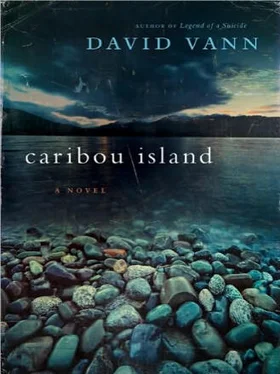David Vann
Caribou Island
My mother was not real. She was an early dream, a hope. She was a place. Snowy, like here, and cold. A wooden house on a hill above a river. An overcast day, the old white paint of the buildings made brighter somehow by the trapped light, and I was coming home from school. Ten years old, walking by myself, walking through dirty patches of snow in the yard, walking up to the narrow porch. I can’t remember how my thoughts went then, can’t remember who I was or what I felt like. All of that is gone, erased. I opened our front door and found my mother hanging from the rafters. I’m sorry, I said, and I stepped back and closed the door. I was outside on the porch again.
You said that? Rhoda asked. You said you were sorry?
Yes.
Oh, Mom.
It was long ago, Irene said. And it was something I couldn’t see even at the time, so I can’t see it now. I don’t know what she looked like hanging there. I don’t remember any of it, only that it was.
Rhoda scooted closer on the couch and put her arm around her mother, pulled her close. They both looked at the fire. A metal screen in front, small hexagons, and the longer Rhoda looked, the more these hexagons seemed like the back wall of the fireplace, made golden by flame. As if the back wall, black with soot, could be revealed or transmuted by fire. Then her eyes would shift and it would be only a screen again. I wish I had known her, Rhoda said.
Me too, Irene said. She patted Rhoda’s knee. I need to get to sleep. Busy day tomorrow.
I’ll miss this place.
It was a good home. But your father wants to leave me, and the first step is to make us move out to that island. To make it seem he gave it a try.
That’s not true, Mom.
We all have rules, Rhoda. And your father’s main rule is that he can never seem like the bad guy.
He loves you, Mom.
Irene stood and hugged her daughter. Goodnight, Rhoda.
In the morning, Irene carried her end of log after log, from the truck to the boat. These are never going to fit together, she said to her husband, Gary.
I’ll have to plane them down a bit, he said, tight-lipped.
Irene laughed.
Thanks, Gary said. He already had that grim, worried look that accompanied all his impossible projects.
Why not build a cabin with boards? Irene asked. Why does it have to be a log cabin?
But Gary wasn’t answering.
Suit yourself, she said. But these aren’t even logs. None of them is bigger than six inches. It’s going to look like a hovel made out of sticks.
They were at the upper campground on Skilak Lake, the water a pale jade green from glacial runoff. Flaky from silt, and because of its depth, never warmed much, even in late summer. The wind across it chill and constant, and the mountains rising from its eastern shore still had pockets of snow. From their tops, Irene had often seen, on clear days, the white volcanic peaks of Mount Redoubt and Mount Iliamna across the Cook Inlet and, in the foreground, the broad pan of the Kenai Peninsula: spongy green and red-purple moss, the stunted trees rimming wetlands and smaller lakes, and the one highway snaking silver in sunlight as a river. Mostly public land. Their house and their son Mark’s house the only buildings along the shore of Skilak, and even they were tucked back into trees so the lake still could seem prehistoric, wild. But it wasn’t enough to be on the shore. They were moving out, now, to Caribou Island.
Gary had backed his pickup close to where the boat sat on the beach with an open bow, a ramp for loading cargo. With each log, he stepped onto the boat and walked its length. A wobbly walk, because the stern was in the water and bobbing.
Lincoln logs, Irene said.
I’ve heard about enough, Gary said.
Fine.
Gary pulled another small log. Irene took her end. The sky darkened a bit, and the water went from light jade to a blue-gray. Irene looked up toward the mountain and could see one flank whited. Rain, she said. Coming this way.
We’ll just keep loading, Gary said. Put on your jacket if you want.
Gary wearing a flannel work shirt, long-sleeved, over his T-shirt. Jeans and boots. His uniform. He looked like a younger man, still fit for his mid-fifties. Irene still liked how he looked. Unshaven, unshowered at the moment, but real.
Shouldn’t take much longer, Gary said.
They were going to build their cabin from scratch. No foundation, even. And no plans, no experience, no permits, no advice welcome. Gary wanted to just do it, as if the two of them were the first to come upon this wilderness.
So they kept loading, and the rain came toward them a white shadow over the water. A kind of curtain, the squall line, but the first drops and wind always hit just before, invisible, working ahead of what she could see, and this always came as a surprise to Irene. Those last moments taken away. And then the wind kicked up, the squall line hit, and the drops came down large and heavy, insistent.
Irene grabbed her end of another log, walked toward the boat with her face turned away from the wind. The rain blowing sideways now, hitting hard. She wore no hat, no gloves. Her hair matting, drips off her nose, and she felt that first chill as the rain soaked through her shirt to her arms, one shoulder, her upper back and neck. She hunched away from it as she walked, placed her log, and then walked back hunched the other way, her other side soaking through now, and she shivered.
Gary walking ahead of her, hunched also, his upper body turned away from the rain as if it wanted to disobey his legs, take off in its own direction. He grabbed the end of another log, pulled it out, stepping backward, and then the rain hit harder. The wind gusted, and the air was filled with water, white even in close. The lake disappeared, the waves gone, the transition to shore become speculative. Irene grabbed the log and followed Gary into oblivion.
The wind and rain formed a roar, against which Irene could hear no other sound. She walked mute, found the bow, placed her log, turned and walked back, no longer hunched. There was no dry part left to save. She was soaked through.
Gary walked past her a kind of bird man, his arms curved out like wings first opening. Trying to keep his wet shirt away from his skin? Or some instinctive first response to battle, readying his arms? When he stopped at the truck bed, water streamed off the end of his nose. His eyes hard and small, focused.
Irene moved in close. Should we stop? she yelled over the roar.
We have to get this load out to the island, he yelled back, and then he pulled another log, so Irene followed, though she knew she was being punished. Gary could never do this directly. He relied on the rain, the wind, the apparent necessity of the project. It would be a day of punishment. He would follow it, extend it for hours, drive them on, a grim determination, like fate. A form of pleasure to him.
Irene followed because once she had endured she could punish. Her turn would come. And this is what they had done to each other for decades now, irresistibly. Fine, she would think. Fine. And that meant, just wait.
Another half an hour of loading logs in the rain. Irene was going to get sick from this, chilled through. They should have been wearing rain gear, which they had in the cab of the truck, but their stubbornness toward each other had prevented that. If she had gone for her jacket when Gary suggested it, that would have interrupted the work, slowed them down, and it would have been noted, held against her, a small shake of the head, perhaps even a sigh, but removed by long enough he could pretend it wasn’t about that. Above all else, Gary was an impatient man: impatient with the larger shape of his life, with who he was and what he’d done and become, impatient with his wife and children, and then, of course, impatient with all the little things, any action not done correctly, any moment of weather that was uncooperative. A general and abiding impatience she had lived in for over thirty years, an element she had breathed.
Читать дальше












